Dickensians! discussion

This topic is about
The Frozen Deep
Dramatic Dickens! Year
>
The Frozen Deep by Wilkie Collins (hosted by Lori)
date newest »
newest »
 newest »
newest »
message 252:
by
Bionic Jean, "Dickens Duchess"
(last edited Mar 26, 2024 04:05PM)
(new)
-
rated it 5 stars
Lori, please can I also all my voice to the appreciative chorus for all your hard work and research. Adding facts from the Franklin expedition enriches our reading so much, thank you enormously! 😊
In our shock at the offhand accusation(s) about the Inuit (or Eskimo/Esquimau as he calls them) as cannibals, we have to remember the time Charles Dickens was writing, and his experience. He was to become very widely travelled, but still never in northern Canada, Greenland, Alaska or eastern Siberia.
The word "Esquimau" actually derives from Algonquian peoples, who were the largest group of Native Americans that lived in Virginia, living as far north as Canada. It means "eaters of raw flesh". It is not therefore surprising then that because this word was generally adopted (throughout Europe too!) in ignorance, the meaning might be extended to human flesh, just as "savages" was routinely used instead of "natives". In that case the two words were used as synonyms, although now we would never say "savage" except as a description of violence, and rarely say "native peoples" either, preferring the neutral term "indigenous".
For the race of peoples Charles Dickens refers to, we now use the word they use of themselves: Inuit, which simply means "the people". 😊
And very good too, but Dickens did not have our advantage of perspective and knowledge. (On the other hand, at this time, the so-called "civilised" world had not interfered with the Inuit people as they have now 🤔🥹)
Lori has provided all the articles he wrote about this (thank you!) and also clarified that Charles Dickens's main thought here was not to despise a people he knew nothing about, but more to concentrate on the valour and bravery shown by the British sailors, who at that time only knew rumours and fears about them too.
In our shock at the offhand accusation(s) about the Inuit (or Eskimo/Esquimau as he calls them) as cannibals, we have to remember the time Charles Dickens was writing, and his experience. He was to become very widely travelled, but still never in northern Canada, Greenland, Alaska or eastern Siberia.
The word "Esquimau" actually derives from Algonquian peoples, who were the largest group of Native Americans that lived in Virginia, living as far north as Canada. It means "eaters of raw flesh". It is not therefore surprising then that because this word was generally adopted (throughout Europe too!) in ignorance, the meaning might be extended to human flesh, just as "savages" was routinely used instead of "natives". In that case the two words were used as synonyms, although now we would never say "savage" except as a description of violence, and rarely say "native peoples" either, preferring the neutral term "indigenous".
For the race of peoples Charles Dickens refers to, we now use the word they use of themselves: Inuit, which simply means "the people". 😊
And very good too, but Dickens did not have our advantage of perspective and knowledge. (On the other hand, at this time, the so-called "civilised" world had not interfered with the Inuit people as they have now 🤔🥹)
Lori has provided all the articles he wrote about this (thank you!) and also clarified that Charles Dickens's main thought here was not to despise a people he knew nothing about, but more to concentrate on the valour and bravery shown by the British sailors, who at that time only knew rumours and fears about them too.
 Lori, thanks for all the links. I still have to read the earlier version of the play to gain full a better understanding but that will be tomorrow. Even with the later version from the Dephi comple Dickens, you can see a big difference in the focus of the play compared to the novel. The "second sight ," theme plays a larger role than in the novella and the authors seem to be pitting Christian values against pagan ( with the Scots seemingly linked with the pagan)
Lori, thanks for all the links. I still have to read the earlier version of the play to gain full a better understanding but that will be tomorrow. Even with the later version from the Dephi comple Dickens, you can see a big difference in the focus of the play compared to the novel. The "second sight ," theme plays a larger role than in the novella and the authors seem to be pitting Christian values against pagan ( with the Scots seemingly linked with the pagan)
 Thanks to both Lori and Jean for their observations about the “Intuit”. I haven’t read all the links yet (Holy Week) but I will. The Far North, the Arctic….these places were true wilderness in Dickens’s time.
Thanks to both Lori and Jean for their observations about the “Intuit”. I haven’t read all the links yet (Holy Week) but I will. The Far North, the Arctic….these places were true wilderness in Dickens’s time. Dickens is not to blame for what was almost a complete
Lack of knowledge about these people. I agree with you Jean.
Here are some more treats from the exhibition I couldn't share earlier for fear of spoilers!
This is a reading copy of the play (first ones show it in the display case but then I got really close):
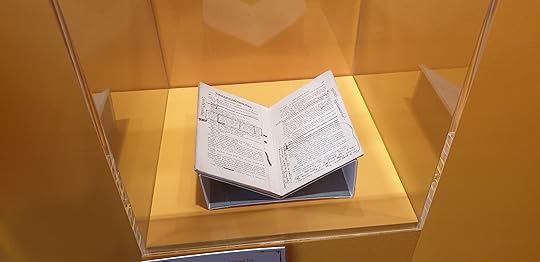

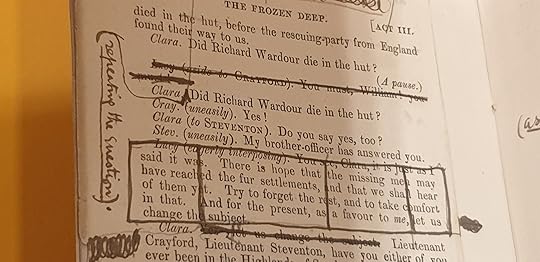
This is a reading copy of the play (first ones show it in the display case but then I got really close):



message 256:
by
Bionic Jean, "Dickens Duchess"
(last edited Mar 29, 2024 09:48AM)
(new)
-
rated it 5 stars
And this shows a copy of the score for the play arranged for piano, first in place and then closer. I would dearly have loved to have a complete copy of this (and I know Lee probably would too!)
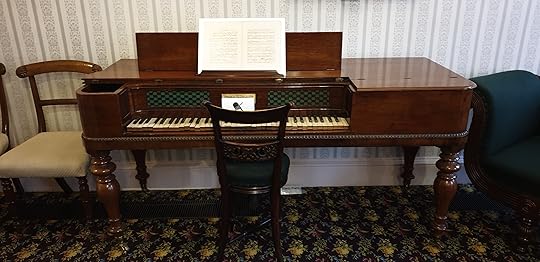
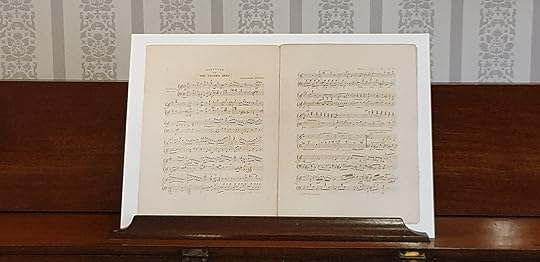
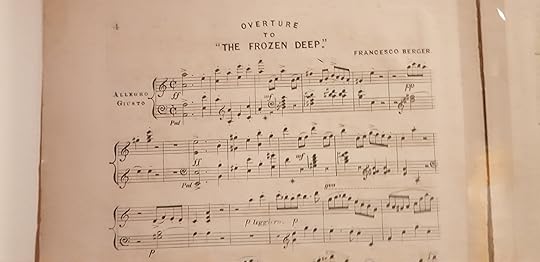
This was the information on a board:
"The music to the Frozen Deep was composed by Francesco Berger, a friend of one of Charles's sons. He also wrote the music for The Lighthouse. He recalled Charles providing extravagant rehearsal dinners for the cast, full of joints of meat, pies and jellies. Berger was also good friends with the Ternan family, and over the coming years would spend Sunday evening playing the piano, while Charles and Ellen sang duets."
I think nowadays the cast would just send out for pizza!



This was the information on a board:
"The music to the Frozen Deep was composed by Francesco Berger, a friend of one of Charles's sons. He also wrote the music for The Lighthouse. He recalled Charles providing extravagant rehearsal dinners for the cast, full of joints of meat, pies and jellies. Berger was also good friends with the Ternan family, and over the coming years would spend Sunday evening playing the piano, while Charles and Ellen sang duets."
I think nowadays the cast would just send out for pizza!
 Bionic Jean wrote: "And this shows a copy of the score for the play arranged for piano, first in place and then closer. I would dearly have loved to have a complete copy of this (and I know Lee probably would too!)
Bionic Jean wrote: "And this shows a copy of the score for the play arranged for piano, first in place and then closer. I would dearly have loved to have a complete copy of this (and I know Lee probably would too!)..."
I'm enjoying all your photos, Jean, and wish I could have seen the exhibition too.
I read that Dickens spared no expense in staging the play at Tavistock House. He had a new stage built and new gas lines brought in for lighting. I think he converted a children's playroom into the theatre. His talented friends designed and painted the sets, and other friends acted in the play. Maybe he figured he owed them some elaborate dinners to thank them! I bet Georgina Hogarth and the household staff had their hands full when Dickens was entertaining.
 These photos are fantastic, Jean! Thank you so much for sharing them. They are so clear it’s priceless! There are online copies of the music and the marked through manuscript but nothing at all as nice as these! And it’s special that you were able to see for yourself up close! (A little jealous 😉).
These photos are fantastic, Jean! Thank you so much for sharing them. They are so clear it’s priceless! There are online copies of the music and the marked through manuscript but nothing at all as nice as these! And it’s special that you were able to see for yourself up close! (A little jealous 😉).I can see from the manuscript this must be the earliest version, at least one that Dickens hand was in more than Collins.
Also, Jean, thank you for your comments on the meaning of Esquimau and the use of the word savage. I love knowing the meaning of words, and it didn’t dawn on me to find out the background on that word. So, many thanks for shedding light on that. And, no, I won’t fault Dickens for his defense of his countrymen or for his lack of knowledge of the Esquimaux themselves.
This was such an intriguing drama to research and present. My thanks to those who participated and read along. It was lots of fun!
 Outstanding! Jean. Lori, I haven't gooten to the earler play version but let me jump in and thank you again for your fine lead on this. You have made it all very interesting and all of you have impressed upon me the need for pictures in these discussions so I will attempt again to figure that all out. Great job Lori and thanks for the hard work.
Outstanding! Jean. Lori, I haven't gooten to the earler play version but let me jump in and thank you again for your fine lead on this. You have made it all very interesting and all of you have impressed upon me the need for pictures in these discussions so I will attempt again to figure that all out. Great job Lori and thanks for the hard work.
 Sam, if you have trouble posting pictures, I would be happy to message you with easy step by step directions. It took me a while to learn to post images, but it's not hard once you get the hang of it.
Sam, if you have trouble posting pictures, I would be happy to message you with easy step by step directions. It took me a while to learn to post images, but it's not hard once you get the hang of it.Lori, this has been an enjoyable month reading with you and the group. Thank you for all your effort.
 Connie wrote: "Sam, if you have trouble posting pictures, I would be happy to message you with easy step by step directions. It took me a while to learn to post images, but it's not hard once you get the hang of ..."
Connie wrote: "Sam, if you have trouble posting pictures, I would be happy to message you with easy step by step directions. It took me a while to learn to post images, but it's not hard once you get the hang of ..."Sure, let me puzzle over it myself a bit and when J need help I will ask.
 I'm glad, Connie.
I'm glad, Connie.Sam, Connie is very good at explaining how to insert pictures. She gave me a refresher! Once you learn, it will take you no time at all!
message 263:
by
Bionic Jean, "Dickens Duchess"
(last edited Mar 29, 2024 12:52PM)
(new)
-
rated it 5 stars
Connie wrote: "Maybe he figured he owed them some elaborate dinners to thank them!..."
Yes, perhaps so! I hadn't thought of that. 😊
Lori - I am hoping to go again over Easter, before it closes. Any requests, anyone? There are quite a few letters from Georgina on display too at the moment.
Oh! I must look for the music online then, thanks! I would have thought it might be a nice addition to the shop, but all they had was the text in different editions. It's quite small though - the Doughty St. Museum is Charles Dickens's house plus the one next door, merged, and the neighbouring one has the shop, cafe, storage and study rooms etc.
Yes, perhaps so! I hadn't thought of that. 😊
Lori - I am hoping to go again over Easter, before it closes. Any requests, anyone? There are quite a few letters from Georgina on display too at the moment.
Oh! I must look for the music online then, thanks! I would have thought it might be a nice addition to the shop, but all they had was the text in different editions. It's quite small though - the Doughty St. Museum is Charles Dickens's house plus the one next door, merged, and the neighbouring one has the shop, cafe, storage and study rooms etc.
 Lori wrote: "It's our last chapter. What are everyone's thoughts about the ending?"
Lori wrote: "It's our last chapter. What are everyone's thoughts about the ending?"Sorry my reading schedule has been so off due to work and other things going on. I thought the ending was what I expected to happen. I felt like the book could have gone either two ways, either Richard is a villain or he is not quite the villain that he is made out to be. I didn't think it would be him being the villain because I thought that would be too obvious.
Big picture: While I enjoyed the book somewhat, it really didn't grip me very much and was way too melodramatic and "fluffy." I know that Collins tends to have a lot of melodrama and pathos in his works, but it feels like his longer works have much more substance/depth, intrigue, precision, and sustainability and power. I think you can't go wrong with the big four (The Moonstone, The Woman in White, No Name, and Armadale). By the way I purchased Man and Wife and hope to read it some day.
I still consider Collins one of my favorite authors and it is always a treat to read him, even his "lesser" works. Thanks for the discussion and all the posts and resources! It was fun !
 Jean, please do tell me if this post is spoilerish and I will delete it. Maybe you knew this already and if not, well, it's very interesting to note how Dickens came up with a future character.
Jean, please do tell me if this post is spoilerish and I will delete it. Maybe you knew this already and if not, well, it's very interesting to note how Dickens came up with a future character.One more tidbit that doesn't have anything to do with the play/novella story but an interesting inspiration for Dickens that came about as a result of acting as Richard Wardour in The Frozen Deep.
Dickens took inspiration from acting in The Frozen Deep for a future novel which was serialized in All the Year Round in 1859, A Tale of Two Cities.
Dickens describes his experience performing as Richard Wardour as contributing to the genesis of the novel.
When I was acting, with my children and friends, in MR. WILKIE COLLINS’S drama of The Frozen Deep, I first conceived the main idea for this story [A Tale of Two Cities]. A strong desire was upon me then, to embody it in my own person; and I traced out in my fancy, the state of mind of which it would necessitate the presentation to an observant spectator, with particular care and interest.
As the idea became familiar to me, it gradually shaped itself into its present form. Throughout its execution, it has had complete possession of me; I have so far verified what is done and suffered in these pages, as that I have certainly done and suffered it all myself.
In A Tale of Two Cities, the character Sydney Carton resembles Wardour and Dickens identified both characters with himself. He apparently originally named him Dick instead of Sydney. HA!
Another interesting tidbit has to do with the character Lucie Manette whose name and physical attributes resemble Ellen Ternan who played the role of Lucy Crayford in The Frozen Deep.
Oh how interesting Lori! (And no I don't consider that a spoiler; you phrased things most carefully 😊)
All the way through I was thinking how Charles Dickens would relish playing this tortured man. (view spoiler)
And I absolutely loved the ending, being completely absorbed in the tale ... and evidently a good bit more gullible than some here LOL! 😂
All the way through I was thinking how Charles Dickens would relish playing this tortured man. (view spoiler)
And I absolutely loved the ending, being completely absorbed in the tale ... and evidently a good bit more gullible than some here LOL! 😂
 Oh good! I’m glad!
Oh good! I’m glad! I haven’t read A Tale of Two Cities yet, but I may put it on my reading list soon!
Books mentioned in this topic
The Strange Case of Dr. Jekyll and Mr. Hyde (other topics)A Tale of Two Cities (other topics)
Les Miserables (other topics)
The Frozen Deep (other topics)
The Frozen Deep: A Drama in Three Acts (other topics)
More...
Authors mentioned in this topic
Charles Dickens (other topics)Charles Dickens (other topics)
Charles Dickens (other topics)
Victor Hugo (other topics)
Charles Dickens (other topics)
More...




Oh and I must just add a reminder everyone, as quite often people say that Dickens reminds them of Victor Hugo's Les Miserables - that almost invariably it is the other way round! Charles Dickens came first! And in this case The Frozen Deep was written in 1856 and the novella later (as we have discussed), but Les Miserables was first published in 1862.
I haven't read the French play, but think that from the number of times this similarity is noticed, Victor Hugo must have been very impressed by Charles Dickens's writing and themes.